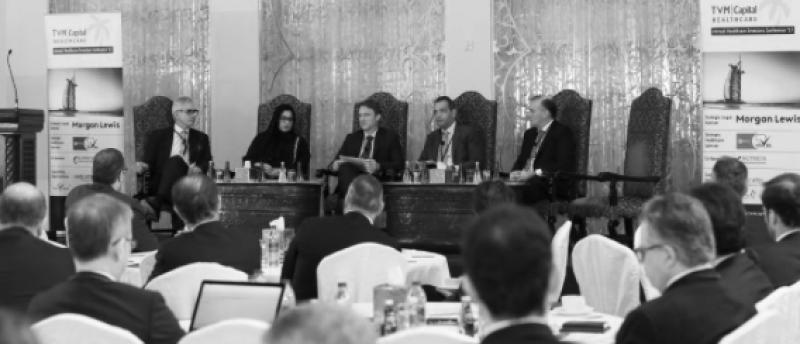Dubai, 19 December 2017: Middle East Healthcare firms that are maturing and considering initial public offerings (IPO) are increasingly likely to list locally because the region’s markets are gaining interest from a wide range of regional and global investors.
Speakers at a conference hosted in Dubai by specialist private equity firm TVM Capital Healthcare said that the inclusion of the UAE markets in the MSCI Emerging Markets Index, and the planned IPO of Saudi Aramco, was putting the region on the radar screens of global investors.
This means that firms listing in the region can attract global institutions as well as tap regional pools of liquidity – from family offices and high net worth individuals — and achieve attractive pricing.
The conference panel, moderated by Chad Floe, Operating Partner at TVM Capital Healthcare, agreed that the UAE was a likely destination for future listings, and that IPOs in healthcare could be attractive because investors value the long term and defensive growth qualities of the sector.
Previous London IPOs by UAE-based healthcare firms NMC Healthcare and Al Noor Hospitals, which has since merged with Mediclinic International, have created a positive reputation for the regional sector among global investors, according to Greg Hughes, Partner and MENA IPO Leader at Ernst & Young.
“MENA healthcare sector IPOs are likely to be well received in the future because of the success stories of recent healthcare IPOs, which have set the scene nicely for companies in the sector. While some companies are looking at local IPOs, others are looking overseas and many are looking at all options, including dual track private sales alongside an IPO.” Hughes said. “The companies considering local listings are mainly looking at the UAE and Saudi Arabia. Listing on home markets can be better value, but it also depends on the individual circumstances, complexity of the transaction, market conditions, and choice of advisor.”
Panelists said that the planned IPO of Saudi Arabia’s state-owned energy firm Saudi Aramco was also putting the region’s capital markets on the map, and helping many large global institutional investors to understand how Saudi and neighboring countries like the UAE work. This should increase liquidity, making the markets more attractive for new listings, but free floats would still need to be around the $150 million mark to be able to attract major institutional investors.
Preparation for life as a listed company needed to start very early with the establishment of robust corporate governance, and a culture of transparency,” said Ayman Khaleq, Managing Partner of the Dubai-based practice of law firm Morgan, Lewis & Backius LLP. Listing on the DFM’s Second Market, where shares in private companies can be traded, could be a useful option before an IPO, he said.
“This forces entrepreneurs to be disciplined, puts them in the shop window for sourcing financing, and gets them used to the levels of disclosure that they will need to adhere to,” Khaleq said. “Investors are laser-focused on the investment story and transparency. Some companies may not have taken this so seriously in the past, but that is changing. We’re on the right track.”
Helmut Schuehsler, Chairman and CEO of TVM Capital Healthcare, said that healthy public equity markets went hand in hand with Dubai’s emergence as a regional centre for innovation and entrepreneurship.
“From our exposure in various markets, we have found that it’s very important for capital markets development that there is the right environment for the entrepreneurial sector to develop,” Schuehsler said. “Dubai could become this hub in the Middle East. There are already the beginnings of ‘fintech’ and ‘healthtech’ here.”
The Annual TVM Capital Healthcare Investors Conference was sponsored by Morgan Lewis, NMC ProVita, Cambridge Medical and Rehabilitation Center, Manzil Healthcare, Bourn Hall International, Nutricia and Taurus Group.
